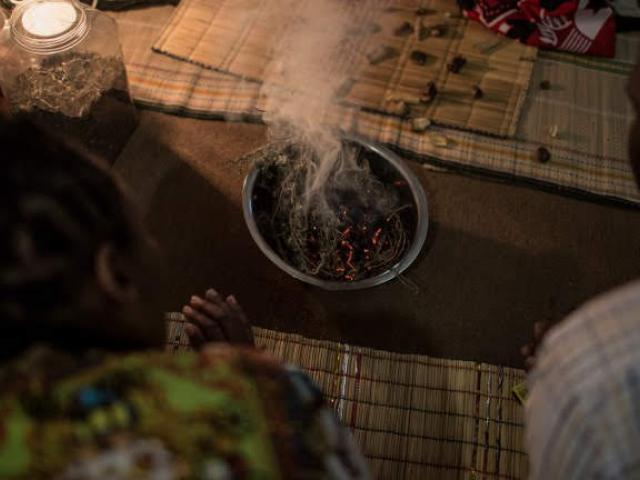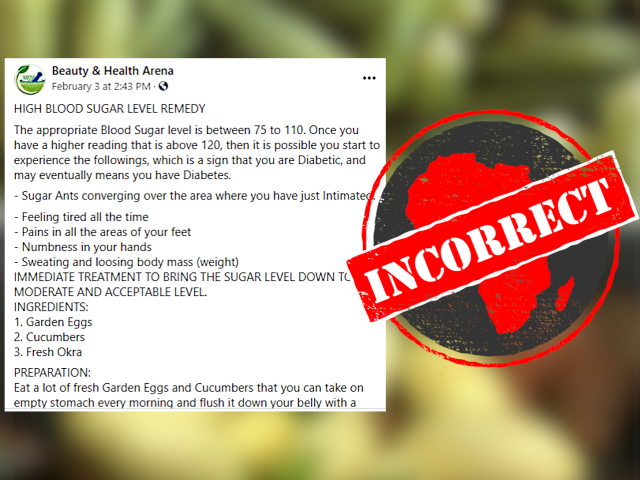- During a morning television show on Kenya's KTN News, politician Beatrice Elachi suggested that people who were very ill should fast for up to five days to stop the disease from “spreading”.
- There may be some benefits to fasting, particularly for improving immune function, experts say. But they warn that there isn't enough scientific evidence to support the claim that fasting cures illness.
- Fasting will harm people who are already unwell and may worsen those with chronic conditions. Prolonged fasting should only be undertaken under medical supervision.
Kenyan politicians regularly appear on television to discuss the news of the day. On the morning of 11 September 2023 Beatrice Elachi, the member of national assembly for Dagoretti North constituency in the capital Nairobi, was a panellist on KTN News.
After some political sparring with her fellow guests, the discussion veered towards “healthy living”.
“Prevention is better than cure,” said Danson Mungatana, the senator for Tana River county, as he called for more physical exercise, including walking, running and sports.
He then argued that the “body can effectively deal with one meal per day”.
Elachi took her cue to promote fasting – abstaining from food and drink for long periods of time – as a way of curing illness.
“If you feel you are very sick but you are able to fast, even for five days, do that, because that is how you deny the disease to spread because diseases thrive on what we take in,” she said.
KTN shared the claim with its 1.4 million Facebook followers.
Africa Check’s artificial intelligence tools, which we use to monitor public debate, also picked up the claim in the Star newspaper, which carried the same quote from Elachi.
We have asked Elachi for the source of her advice and will update this report with her response.
Nonetheless, we went digging.
‘Scant’ evidence, says scientific study
Dr Sara Rosenkranz is an associate professor in the department of kinesiology and nutrition sciences at the University of Nevada in the US. She has expertise in nutrition, exercise, physical activity and cardiometabolic health.
“Are we talking about no caloric intake or really just caloric restriction? Also, what type of illness, and how sick are the people?” she asked about Elachi’s claim.
All of these factors played a role in making recommendations to the public, Rosenkranz told Africa Check over email.
“Fasting for improving immune function is not new and has been around for a very long time. However, the state of the research is that it has been done mostly in non-human animal models and or even in cell models,” she said.
A 2022 study of “traditional and medical applications of fasting” in the journal Nutrients found that “strong human evidence of any health effect induced by prolonged fasting is scant”.
The study also warned that any long-term fasting should be done under medical supervision.
While some studies in mice have shown that prolonged fasting, such as for 48 to 120 hours, helps protect the body from stress and toxins, Rosenkranz said that the evidence was not rock-solid.
It mostly showed how these practices might work, rather than giving a clear answer about their actual benefits when it came to disease, she said.
Context really matters
Rosenkranz said that most of the evidence suggested a potential benefit of fasting for improved immune function in bacterial infections, such as bacterial pneumonia, gastroenteritis, food poisoning and bacterial sinus infections.
However, this might not be true for viral infections, as it had been found that intake of glucose was protective in viral inflammation.
“For example, during the common cold or the flu, it would likely not be beneficial and potentially quite harmful to engage in prolonged fasting. In particular, it may not be beneficial to fast during the viral SARS-CoV-2 infection that can develop into Covid-19,” Rosenkranz said.
The importance of nutrient intake should be considered during a viral illness, particularly as viruses use your body’s cells to replicate, they tend to “steal” nutrients from the host which need to be replenished.
Elachi’s five-day fast won’t work as a general prescription
“As much as fasting may provide certain health benefits, it is not a solution for disease control and should not be given as a general prescription for illnesses,” said Dr Zipporah Bukania,
Bukania is a senior research scientist in human nutrition and a deputy director at the Kenya Medical Research Institute. She also oversees the Centre of Public Health Research in Nairobi.
Bukania said that when cells fought disease or regenerated to heal from infection, they needed essential nutrients. In particular, some diseases might be the result of nutrient deficiencies and would therefore require replenishment of the necessary nutrients.
“Depriving the body of nutrients may lead to the development of certain conditions resulting from nutritional deficiencies," she told Africa Check by phone.
According to Rosenkranz, there is no evidence to recommend a complete five-day calorie-free fast.
“If a person is deficient in nutrients already, a sustained fast would lead to worsening of such deficiencies. Additionally, in the critically ill or very elderly patients, fasting during a bacterial illness could be quite detrimental,” she said.
Risky advice
Prof Krista Varady is a professor of kinesiology and nutrition at the University of Illinois Chicago in the US. She researches intermittent fasting for weight loss and reducing metabolic disease in people with obesity.
Varady cautioned that patients with certain chronic or serious health conditions should not undertake prolonged fasting as it might worsen their condition.
“People with diabetes should consult their doctor before fasting. If they discontinue their medication or alter treatment regimens too fast without consulting their doctor, serious complications may develop, such as dehydration and the inability to regulate blood glucose and insulin levels,” she wrote, via email.
Rosenkraz said that if someone had chronic kidney disease, it was not advisable for them to fast because it could cause problems with the body's mineral balance and worsen their kidney function.
Bukania agreed. “We cannot have a blanket prescription for everyone. In nutrition, every prescription is individualised,” she said.
In short, it is not recommended to go on a complete fast for five days, especially if you are ill and without consulting your doctor.
As the 2022 study in the journal Nutrients cautioned: “Physicians should be aware that misinformation is pervasive and that their patients often adopt dietary regimens that are far from being clinically validated.”
Conclusion: No evidence that fasting helps the very sick, as claimed by Kenyan politician
Speaking on national television, lawmaker Beatrice Elachi advised those feeling very ill to fast for up to five days to “deny the disease to spread because diseases thrive on what we take in”.
Experts say there is research into how fasting might work to improve immune function, but there isn't strong evidence for this in humans. There's also no evidence for a five-day fast, which they say could worsen existing conditions, such as those caused by nutrient deficiencies.
Long-term fasting could also have serious consequences for seriously ill, elderly or chronically ill people. In other words, don't do it – especially not unsupervised.





Add new comment